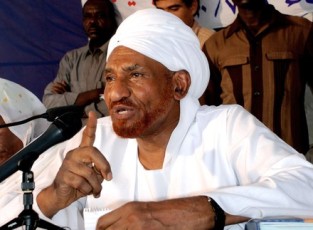Ex-Prime Minster sees ‘cold war’ between Sudan, South
July 24, 2011 (KHARTOUM) – Sudan’s former prime minister, Al-Sadiq al-Mahdi, has sounded the alarm over what he termed as “the harbingers of a cold war” between his country and the new state of South Sudan.

As talks to untangle the two countries have been held for months behind closed doors, Sudan and South recently appeared at loggerheads over the currency issue. Sudan responded to what it saw as a premature and uncoordinated launch of the South’s currency by introducing its own new currency, stoking fears of an economic warfare between the ex-war foes.
Meanwhile, the south objected to the 32.8 USD price set by Sudan for the transfer of the south’s oil – the bulk of the country’s estimated production of 500,000 barrels a day – through its pipelines. Southern officials said the price was too steep.
In a symposium held in El-Obeid capital of North Kordofan on Sunday, Al-Mahdi, who is the leader of the mainstream opposition National Umma Party (NUP), said that the coming cold war had began to manifest itself on oil disagreements, currency and trade.
The veteran opposition figure further warned that the way in which the two countries handled post-secession issues was “a terrible mistake” that sets the stage for a new conflict involving the volatile regions of South Kordofan, Blue Nile and Darfur.
Sudan has been waging war against forces aligned with South Sudan in South Kordofan State since 5 June.
According to Al-Mahdi, who had two spells in power as Sudan’s prime minister before being unseated in 1989 after the current regime of president Al-Bashir seized power in a coup, the government was currently facing a bout of pressures stemming from youth groups on Facebook as well as voices calling for unifying the armed struggle in Kordofan, Blue Nile and Darfur to overthrow Khartoum government.
He further warned that Sudan was bound to descend into a new circle of conflicts and wars unless the government responds to “the national agendas” which he defined in a new constitution for a broad Sudan and establishing new relations with the south on the basis of mutual interests.
Al-Mahdi’s party decided to engage in a dialogue with the ruling National Congress Party (NCP), alienating main opposition allies who continue to call for regime change. Al-Mahdi consistently defended his decision, saying it aims to protect Sudan from disintegration.
However, he recently said that the dialogue has made slow progress amid disagreements over the issue of the International Criminal Court (ICC), which seeks al-Bashir’s arrest against the background of Darfur conflict, and the formation of a national government.
As he spoke on Sunday, he warned that if the government fails to respond to the people’s demands for change, the domestic political arena would be open to all options and his party will then choose the option that safeguards rightness.
(ST)
